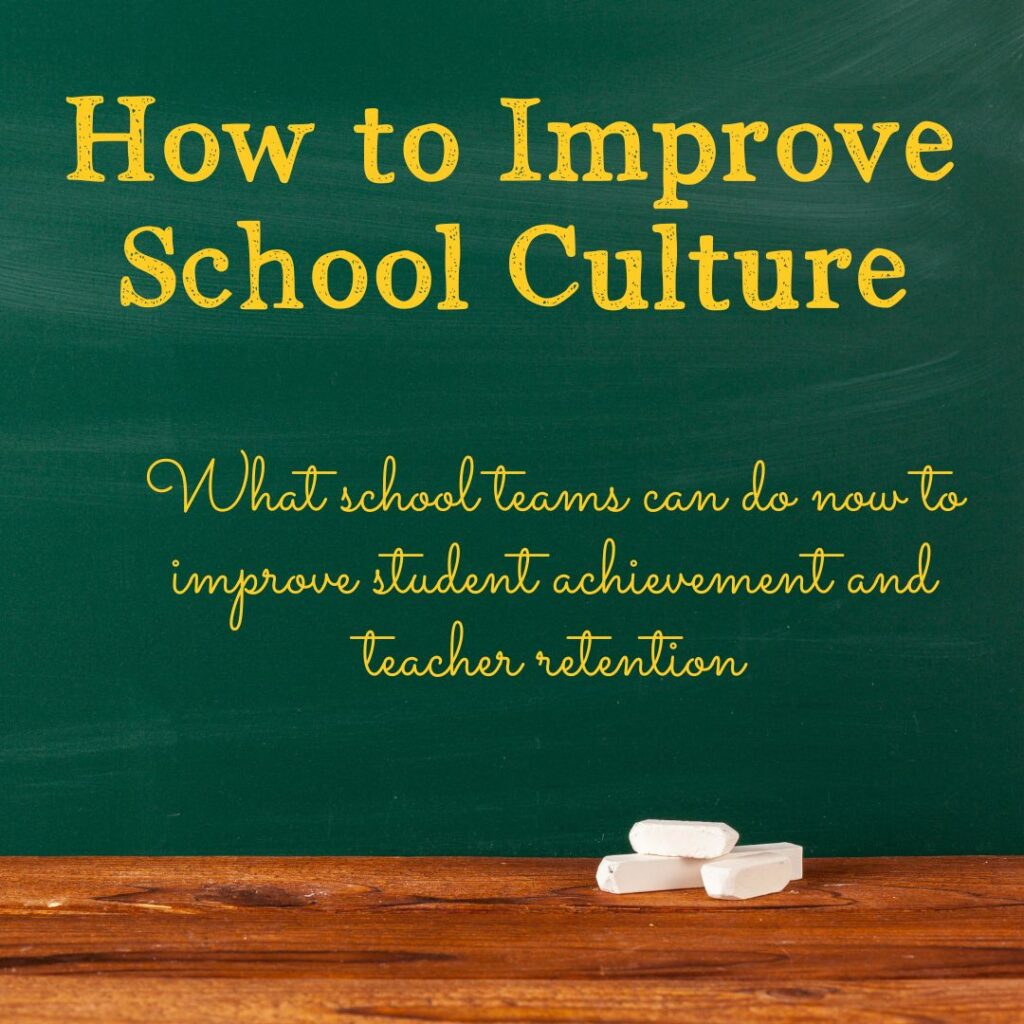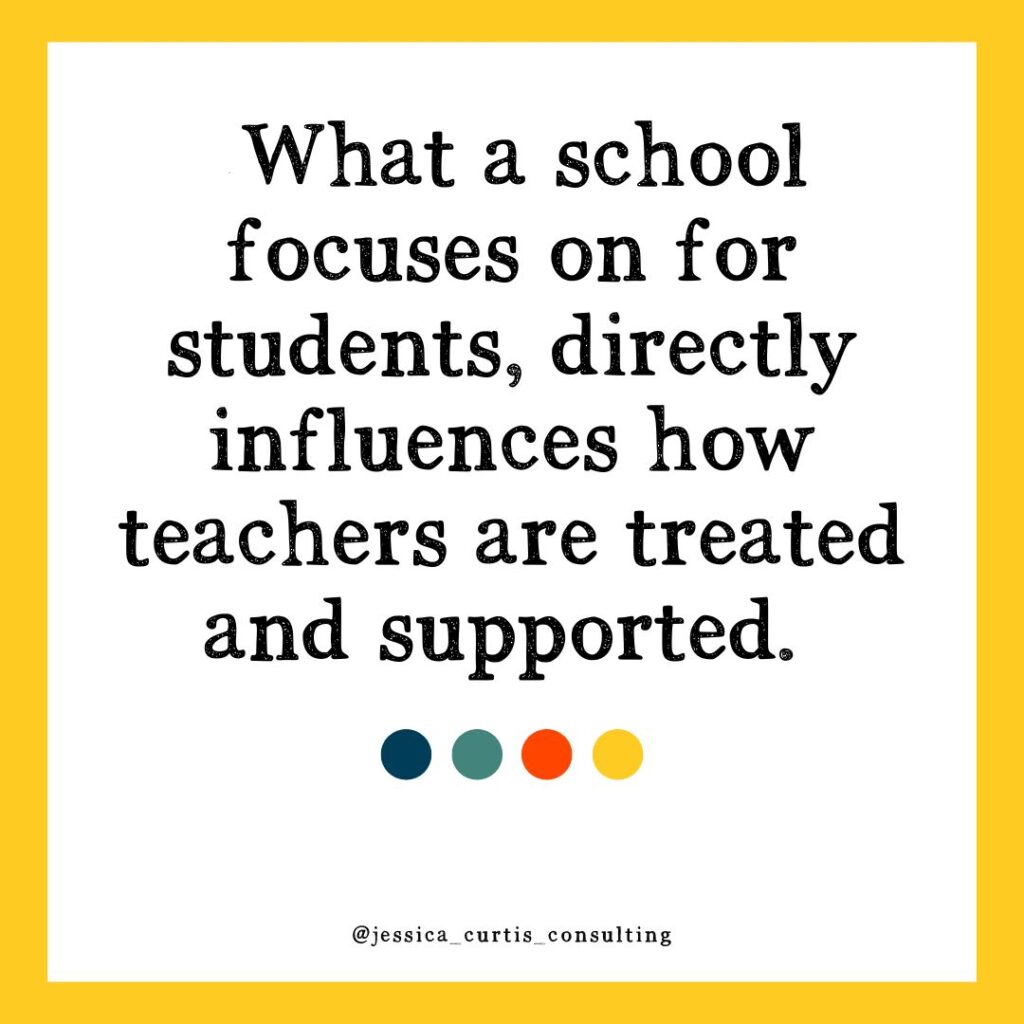How to improve school culture

School culture is a nebulous concept that can be difficult to define or even describe. But, when a school has a bad culture, everyone knows it!
School culture is a big factor in student progress, teacher job satisfaction (and retention), as well as community involvement. If your school is struggling with any of these issues, it may well be a school culture issue.
So, what can administrators or teachers do to improve school culture?
We know that school the teachers work really hard to get into. The administrators are described as supportive, and the students are making good progress. Teachers get into this school and stay there as long as they possibly can. Turnover during a normal school year, as in not after pandemic teaching for two years, is minimal at most.
Teachers in this school talk about how much they love their school team, and give examples about the impact that they are having in the lives of their students and often the community in general. These schools sound like wonderful places to work right?
But…
We also all know that school that has high teacher turnover and struggles to perform year after year.
Some may blame the clientele of the school, but the fact is, teachers stay in schools where the students are difficult but they feel like what they are doing is making a positive impact. Teachers flee places where they feel they are just a cog in the machine, or feel unsupported.
This boils down to a weak or poor school culture. Schools where teachers feel unsupported and as though they aren’t making an impact beat down even the best, most high quality teachers.
The difference in the two schools isn’t the clientele. The fact is, there are fantastic schools who are performing well in really rough neighborhoods. The difference in the two schools is the school culture.
What is school culture?

There are a bunch of definitions out there, but the best way that I can describe school culture is the focus that the entire school has when it comes to student learning, progress, and support.
Notice, I didn’t emphasize teachers there. This is because, what a school focuses on for students directly influences how teachers are treated and supported.
School focus versus school culture
Schools who focus on increasing state testing scores or school grades, create an environment of competition among teachers. Resources are provided differently, and professional development is determined and provided in a different way.
These schools tend to focus on using processes to move under-performing students into special education quickly. This is so that students can receive accommodations or support during testing days. If this is the focus, progress toward grade level for underperforming students is minimal at best.
Schools who are focused on student progress toward grade level create an environment of collaboration among teachers. These schools provide resources based on student need, and professional development to help teachers specifically deal with the needs of their students.
Teachers in these schools are looked at as the experts on their students, and their input on interventions is valued. When these teachers ask for professional development in a certain area because their students are struggling, they often get it.
These schools focus on students getting to and remaining on grade level as quickly as possible. They believe that all students can learn, but that some need more interventions or supports to get and remain there. While special education is a possibility, it is only after the teams have determined that the interventions in general education aren’t going to be enough for the student to be able to be successful in the long term.
How do we change school culture to focus on student progress rather than school grade or standardized tests?

The first step is to develop data teams which are focused on using the standardized measures to determine skill gaps. Then create appropriate groups where students receive interventions focusing on those skills. Beginning to reframe standardized tests as a tool, rather than the end of the race helps school teams to better address student needs.
Once these school teams are developed and implemented, they should meet regularly to discuss progress monitoring data based on the skill deficits. This should not been a meeting to just discuss the latest results from the standardized measure or universal screener. While this data can be part of the meeting, the focus should be on individual students and the progress that they have made mastering the skills which were identified as deficits. The discussion should center around the progress, if the student mastered the skill, or if interventions need to be adjusted.
How can data meetings improve school culture?
Invite parents, teachers, and interventionists to these meetings to focus the discussion on the individual student’s progress and what can be done to help the student get on grade level as quickly as possible. This fosters a collaborative environment where all of the stakeholders are working toward the same goal….the student getting to and staying on grade level.
As students make progress, different skills need to be addressed and data tracked. Also, the mastered skills should be celebrated for that student and the teachers working with the student. Share resources and supports because the team is working toward the same goal. No one on that team wins, unless the student is making good progress.
These school teams must meet consistently throughout the school year so that progress and interventions can be monitored and adjusted as needed. The consistency of the meetings helps parents, teachers, and interventionists to see that the work they are putting in is worthwhile and appreciated.
It takes time to develop collaborative, cohesive teams who truly support each other. But, I promise that the effort put into creating and maintaining these teams is well worth it. Over time, these collaborative teams will impact school culture. More teachers, interventionists, and team members will see that the focus is on student progress. Attitudes towards lower performing students will improve. Over time attitudes will change from “the student needs help from someone other than me” to “every student can learn, we haven’t figured out what this student needs yet”
Teachers and interventionists who feel supported and know they have a team to collaborate with, are more willing to innovate.
They are willing to be more flexible in how they provide support, or report student progress. This helps students to make higher levels of progress more quickly. Teachers feel like the effort they are putting in is worthwhile and appreciated. This feeling is contagious in schools where collaboration is supported through MTSS or data teams.
It takes time to change school culture, but shifting it can be done when small teams are encouraged to collaborate for a common goal….student progress.
